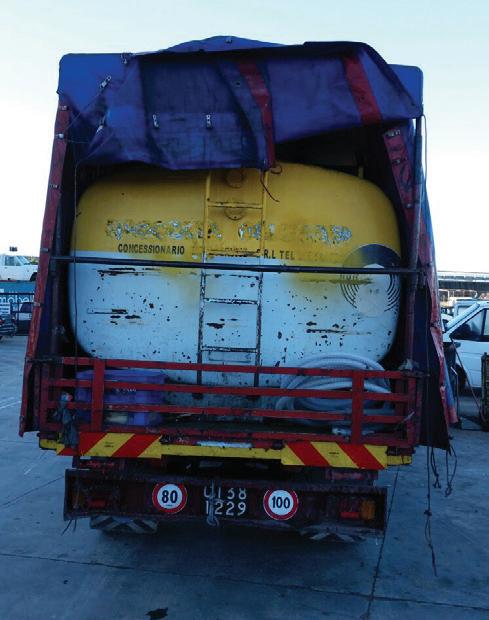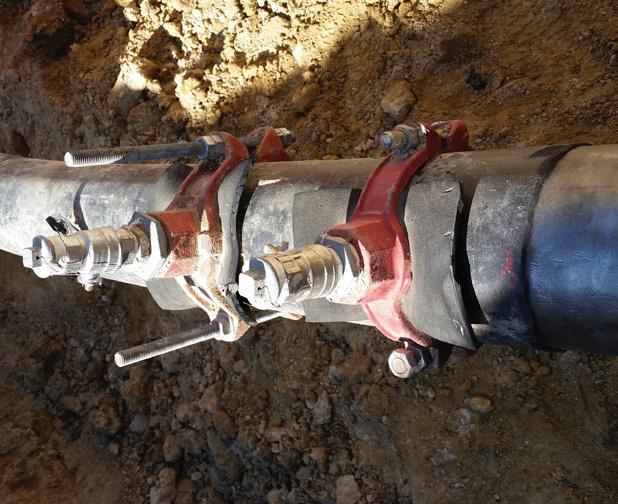
3 minute read
Operation "Black Gold" Nabs Jet Fuel Thieves
Sigonella’s Carabinieri and NCIS Team Up to Solve Case
By Janine Scianna / NAS Sigonella Public Affairs
Advertisement

Maj. Salvatore Menta, Commander of the Carabinieri’s Sigonella Company, led the investigation of the jet fuel theft.
(U.S. Navy photo by Janine Scianna)

Fuel transport was disguised as a water delivery truck
(Photo courtesy of Carabinieri)

Sophisticated valves were drilled into the pipeline to siphon fuel
(Photo courtesy of Carabinieri)
Using sophisticated methods, the alleged criminals siphoned off 100,000 liters of jet fuel at a time while operating in remote areas of eastern Sicily to avoid detection for nearly three years. They used rented vehicles and trucks, operated mostly at nighttime, and used stolen cell phone chips registered to unsuspecting customers to cover their tracks. They excavated areas of the pipeline, drilling into it and installing special valves and hosing to pump the stolen fuel into borrowed trucks. They then sold the stolen fuel on the black market, where it was used either as a kerosene-type fuel for heating buildings or mixed with other components for use as a vehicle fuel.
Since October 2016, the operation caused the economic loss of 800,000 Euros—representing the stolen fuel’s cost as well as massive environmental cleanup costs. But the criminal ring’s covert efforts were still too primitive for the teamwork of Sigonella’s Carabinieri and Naval Criminal Investigative Service. Today, the 18 alleged perpetrators—14 fuel thieves and 4 accessory vehicle drivers—await trial for crimes committed during their nearly three-year long operation.
A NATO pipeline runs between Augusta Bay and Sigonella. Along its 36-kilometer run, the pipe carries important JP-5 jet fuel to power Sigonella’s aircraft. The aircraft here rely on so much fuel that trucking volumes of it back and forth between the port and base would not only be inefficient, but also dangerous. The pipeline runs underground, often through isolated and privately owned land. Once noticeable pressure drops in the pipeline were felt downstream, it became obvious that theft was occurring somewhere along the pipeline’s span. But where exactly that was happening? How were they doing it? And how would the authorities catch them?
The Carabinieri’s operation began with identifying segments of the pipeline that would be conducive to theft and tracked the potential perpetrators. With these general locations identified, the next major challenge was figuring out how the theft scheme worked and more importantly, who the perpetrators were. Enter NCIS. Part of their investigative work involves designing custom crime-detection technology. For the pipeline case, NCIS Special Agent Joseph Todd built camouflaged infrared cameras that were installed at the suspected theft sites.
The cameras provided video imagery of the operation in realtime, capturing vehicle license plate numbers and the faces of the perpetrators. Combining the gathered information, the Carabinieri were able to identify one of the alleged criminals and later, the other perpetrators.
The Sigonella Carabinieri Company Commander, Major Salvatore Menta commented on how important the support of the NCIS was in investigating the fuel theft case.
“NCIS offered maximum cooperation,” said Menta. “By combining the traditional investigative techniques along with the high-tech equipment provided by NCIS, we were able to identify the perpetrators.”
NCIS Supervisory Special Agent Jon Greenert also explained why ongoing collaboration with the Carabinieri and other Italian law enforcement authorities is important to their investigations.
Greenert noted that the positive relationship they have with the Carabinieri has led to other cracked cases, like when 25 protestors cut the fence line of Sigonella’s front gate in 2018. NCIS was able to capture imagery and use facial recognition technology to help the Carabinieri identify all of the perpetrators.
Together, the machinery of all the local law enforcement agencies hums steadily behind the scenes. Though their work rarely gets highlighted to the community, their investigative expertise helps keep the entire Sigonella community safe.










